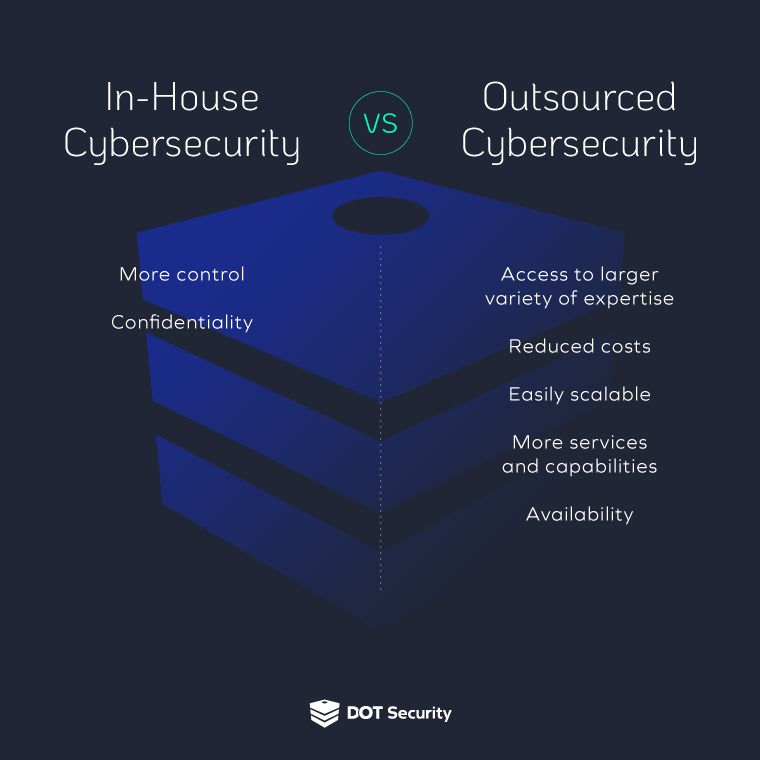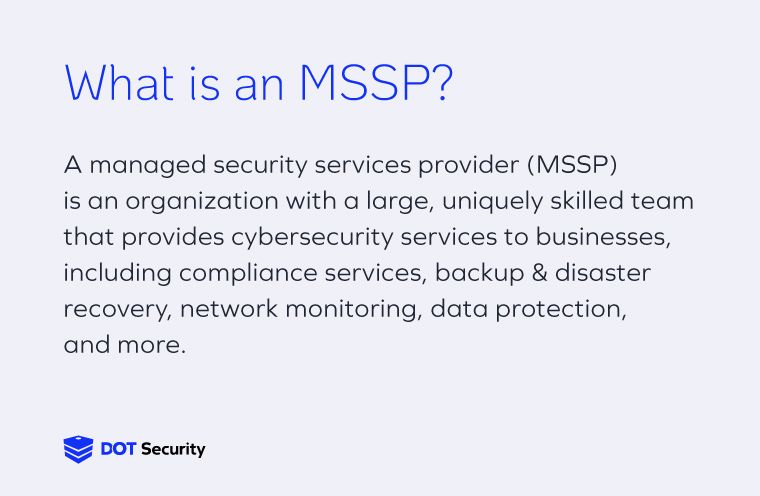Cybersecurity Consulting
Do You Need an MSSP? In-House vs Outsourced Cybersecurity
September 15, 2022
8 Minutes

In-house or outsourced cybersecurity? That’s a question many businesses are faced with these days as cybersecurity has become more important and even necessary.
Both have pros and cons, but what’s really the difference between the two and how can you decide which one is right for your business?
Sign up for our newsletter!
In-House vs Outsourced Cybersecurity: What’s the Difference?
In basic terms, the difference between an in-house and outsourced cybersecurity team is obvious: in-house means an internal team while outsourced means external. While that is the difference at its most simple, the real differences lie in what each can do for you and what it takes for businesses to get them.
An external team lacks the requirement to actually build out a team of people by hiring and retaining talent while an in-house team gives you more control over who handles your cybersecurity and how you assign projects and focuses when building a strategy.
At the end of it all, both can result in a strong cybersecurity team, but outsourcing, for the most part, removes the headache-filled aspects while reducing costs.
Below we’ll walk through some of the major benefits of doing both and what each brings to the table to help businesses build out their cybersecurity defenses and establish their posture.

Benefits of Outsourced Cybersecurity
Partnering with an MSSP for outsourced cybersecurity brings many benefits for businesses, including key ways to cut costs without sacrificing security and experience. Here are some of the main benefits of outsourcing your cybersecurity needs:
-
More Cost Effective: The cost of entry for a complete, experienced cybersecurity team is massive, especially if you’re building one from scratch or expanding one from an existing IT team. With an MSSP, you can skip the costs of recruiting, retainment, and replacement, and get full access to a team of experts in all disciplines of cybersecurity right away for a fixed cost.
-
Access to More Expertise: In addition to the lowered costs, businesses that partner with an MSSP for their cybersecurity also get access to a larger variety of expertise. MSSPs like DOT Security have compliance managers, penetration testers, analysts, developers, vCISOs, and many more specialists.
-
Easily Scalable: If you need flexibility, an MSSP is the best option because you always have the ability to scale your services up or down depending on your current needs and goals. An MSSP can quickly and easily grow with you and meet the increased demand when necessary.
-
More Capabilities: With more experts comes more capabilities. An MSSP can provide your business with multiple specialty services including edge security, network monitoring, secure data protection, access management, backup and disaster recovery, and general consulting.
-
Availability: In-house team members take time off, get sick, retire, and they quit. With an MSSP, your cybersecurity team is always available, never takes time off, and is constantly ready to help you stay secure.
-
Access to a Security Operations Center: A security operations center (SOC) is the beating heart of a cybersecurity operation. It’s the home of all security specialists and acts as your security hub if you choose to partner with an MSSP. A SOC contains all the experts and technology necessary to stay secure against modern threats.
Related: MSSP Security Operations Center (SOC) Explained
Benefits of In-House Cybersecurity
While not as robust, and mostly dependent on how much money you’re willing to invest into your team, an in-house team can provide the same benefits as an outsourced team just with the additional costs and time commitment that comes with obtaining and maintaining a full-fledged security team.
Other than that, there are a few main benefits that an in-house team can bring to an organization:
-
Reduced Risk: Businesses that choose to form an in-house cybersecurity team might find it easier to trust internal team members with sensitive information. This can reduce the risk because it narrows the number of outside people who have access to confidential data.
-
More Control: An in-house team is also under more control. This means you can choose which specialties to focus on, who to hire, who to assign to projects, and more.
How to Choose an MSSP
If you choose to partner with an MSSP, there are many things you must consider in order to choose one that aligns with your goals and provides the services, solutions, and expertise that you need to stay secure.
Related: What Does a Managed Service Relationship Look Like?

Here’s a look at what you should be looking for when choosing an MSSP:
-
The state of their security operations center (SOC). A SOC is essential in today’s cybersecurity climate because it brings all security personnel under one roof to collaborate, communicate, and monitor for the worst threats.
-
What services do they offer? Make sure the MSSP you choose has the services you require. For example, if you work with government contracts (specifically the Department of Defense), then you need a compliance manager to help you with CMMC. Does your chosen MSSP have a compliance team?
-
What’s their process and approach? An MSSP needs a good process that involves technology implementation, expert consultation, a comprehensive assessment period, and quick but effective implementation.
-
Do they specialize in your industry? Some industries have special needs or requirements due to the type of information they handle or due to government regulations. Ensure your choice of MSSP can handle what’s required by your industry.
Why DOT Security?
DOT Security has all the technology, facilities, and expertise to secure your business. We have specialists in all disciplines of cybersecurity—including compliance, edge security, identity and access management, awareness training, secure data protection, network monitoring, and more, all from our newly-opened, Illinois-based security operations center.
Learn more about what DOT Security can do to secure your business today.
